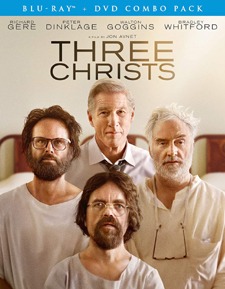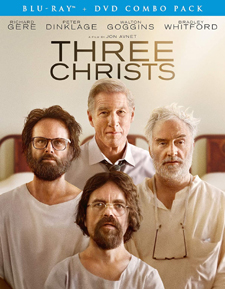Three Christs (Blu-ray Review)

Director
Jon AvnetRelease Date(s)
2017 (June 16, 2020)Studio(s)
IFC Films (Shout! Factory)- Film/Program Grade: B-
- Video Grade: B
- Audio Grade: B
- Extras Grade: D-
Review
Based on the research of social psychologist Milton Rokeach, Three Christs is the story of the treatment of three schizophrenic state mental institution patients who claim to be Jesus Christ. In an experimental 1959 program, they are placed under the care of Dr. Alan Stone (Richard Gere), who opposes the accepted treatments of the time—electroshock, straitjackets, and heavy drugs. He believes talking with his patients can yield more beneficial results.
Dr. Stone has been given authority to conduct his experiments in a Michigan state mental institution run by the skeptical Dr. Orbus (Kevin Pollak). Stone hires a few assistants, among them Becky (Charlotte Hope), who has a special reason for wanting to be involved. Dr. Stone chooses as his patients Joseph (Peter Dinklage), Clyde (Bradley Whitford), and Leon (Walton Goggins) because each of them insists that he is Jesus.
Joseph, who loves opera and speaks fondly of England, has been mistreated because of his dwarfism. Clyde, who says he is Christ but emphasizes that he is not of Nazareth, is a muttering widower who feels guilt for his wife’s death. Leon is an angry, disheveled war veteran given to highflown oratory and mind games who might prove dangerous to Becky.
Dr. Stone arranges for the three men to live and have their therapy sessions together so that they must confront the fact that they all claim to be Christ. The doctor’s compassion earns their trust and he makes sure they are not subjected to shock treatments, even when they become agitated. When word of Stone’s progress spreads through the psychiatric community, Dr. Orbus intrudes into their care in order to share the acclaim. This interference leads to serious reversals and bureaucratic confrontation.
Directyor Jon Avnet (Fried Green Tomatoes) elicits excellent performances but diffuses the film’s focus rather than concentrating on Stone’s relationship with the three patients. We meet his brilliant wife, Ruth (Juliana Margulies), who is frustrated at not having been able to pursue a career in research after marriage in the late 1940s and has settled on becoming a high school chemistry teacher. Another subplot involves Becky and her troubled past. There is also the conflict between Stone and Orbus. We get so little information about the backgrounds of the three men Stone is treating that they seem like extras who wandered in from One Flew Over the Cuckoo’s Nest.
Gere is passionate as Stone and his nice-guy persona works well for the character. Though Stone has a degree of autonomy, he is still subject to the director and rules of a state institution, so he does not have a completely free hand and his treatments are sometimes destructively thwarted—even as the patients show progress. Stone has a God-like fixation, yet Gere never turns him into a Dr. Frankenstein. He’s a master puppeteer—manipulating, adjusting, and controlling at every turn in the interest of trying to unlock, decipher, and heal the minds of his three patients.
Margulies’ Ruth is there mostly to give us a glimpse of Stone’s home life, which appears to be happy, but beneath the loving wife and mother is a deeply frustrated woman. Margulies convinces us that Ruth is exceptional and had ambitions that the “man’s world” marginalization of the period caused her to abandon.
James Monroe Inglehart, who plays the orderly Benny, has little to say but projects care and compassion for the three patients, as well as the efforts of Dr. Stone. Competent and conscientious, Benny appreciates how Stone’s approaches differ markedly from the norm.
The best sequences show sessions with the doctor, the patients, and his assistants. We see gradual improvement in the patients’ behavior, greater socialization, and growing respect for one another. Dr. Stone wins their trust when he has them vote for a chairman at each meeting, and later looks into why their mail to Dr. Orbus hasn’t been answered, allows them a degree of self-determination, and personally calms them in moments of crisis.
Three Christs has the feel of a documentary as we watch Stone initiate his research, meet the subjects, experience breakthroughs and setbacks, and face harsh realities. But instead of building to a natural climax, the screenplay by Eric Nazarian (based on Dr. Rokeach’s book The Three Christ of Ypsilanti), resorts to an overly dramatic scene which departs significantly from the preceding facts and seems like a desperate attempt to punch up the emotion. This is a well-intentioned effort that never has an authentic Big Moment. The film coasts along without ever elevating the true events to more than an exercise in academic dissertation.
The Blu-ray release, featuring 1080p High Definition resolution, is presented in the widescreen format of 1.85:1. The picture is well defined and details, such as the objects on Dr. Stone’s desk, the tiled floor where meetings take place, patterns in clothing, and character wrinkles in Gere’s face, are nicely delineated. The color palette is subdued. Whites dominate the clothing of the inmates and orderlies. Becky’s outfits are conservative, as is her hairstyle, likely so as not to provoke sexual feelings in the men. Stone is seen mostly in suits. He doesn’t wear hospital attire to remove what may be unpleasant associations to his three patients.
The soundtrack is English 5.1 DTS-High Definition Master Audio. Optional subtitles include English SDH and Spanish. Dialogue is distinct throughout. Even Clyde’s mutterings can be discerned and his breaking into the Chock Full O’ Nuts coffee jingle is an unexpected comic moment. Dr. Stone begins each session with having everyone present sing America the Beautiful, with all the attendant sour notes and departures from the beat, but it’s touching and a very real moment. During a scuffle in a treatment room, we hear equipment crashing, bodies falling, and a punch on someone’s jaw. When one of the men is undergoing a crisis and crying out in distress, his head is cradled by Dr. Stone until he calms down. In one brief scene, one of the men is seen screaming in frustration, but since we see him through a thick window, we don’t hear him. Jeff Russo’s score is intelligently positioned and helps convey the right feeling while not overpowering the images.
The only bonus feature on the Blu-ray/DVD Combo Pack is the film’s theatrical trailer. Three other trailers precede the movie: Ophelia, Mary Magdalene, and The Nightingale, which cannot be bypassed.
– Dennis Seuling

